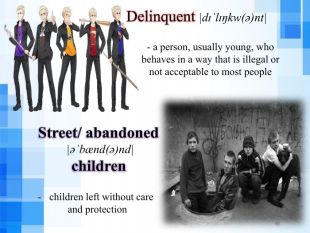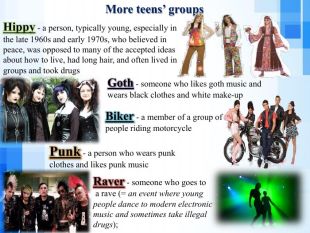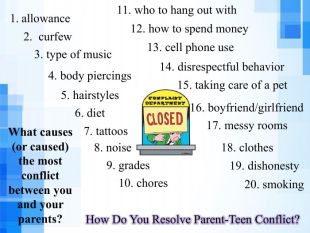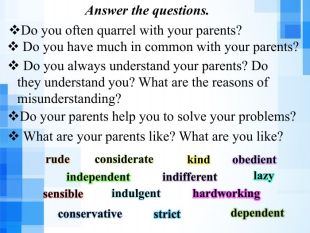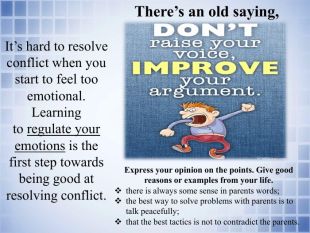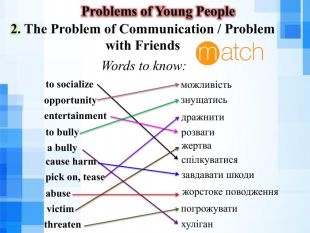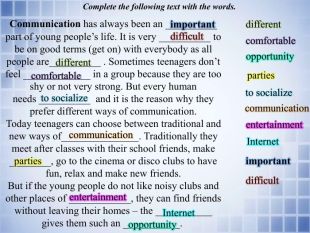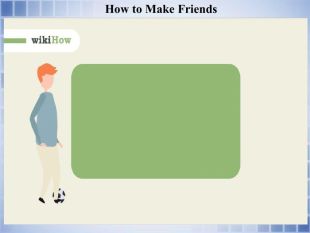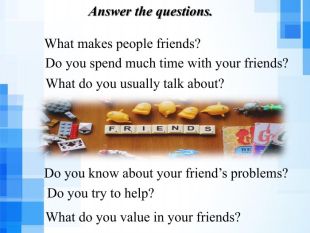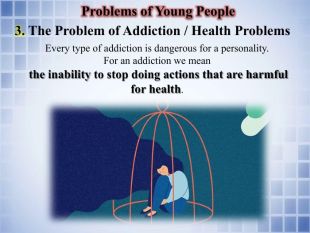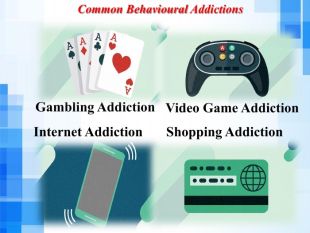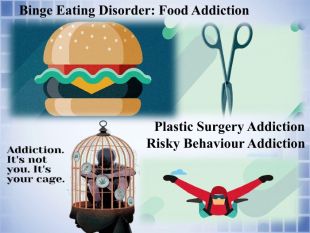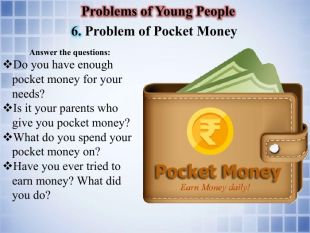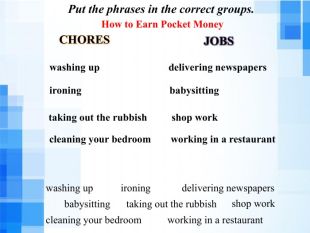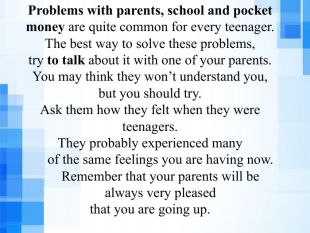Презентація з теми "Youth.Teens."
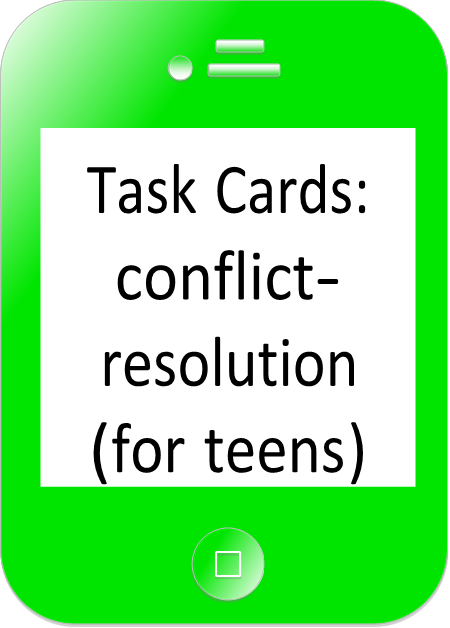
©Copyright 2018 Jessie Drew, LLC www.mygroupguide.com
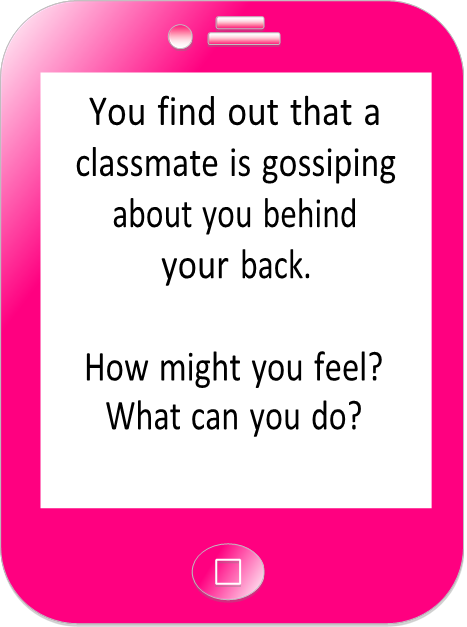 Your sibling borrowed your favorite shirt
Your sibling borrowed your favorite shirt
 without asking, and you discover a hole on
without asking, and you discover a hole on
the sleeve.
How might you feel?
What can you do?

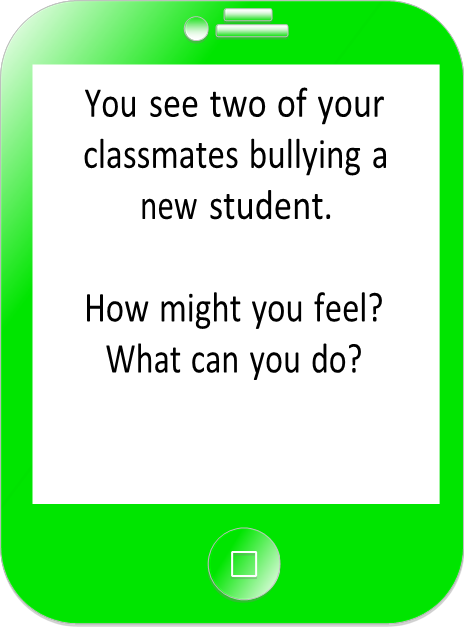 A classmate sitting in the desk next to you always tries to cheat during tests by looking at
A classmate sitting in the desk next to you always tries to cheat during tests by looking at
your paper.
How might you feel?
What can you do?
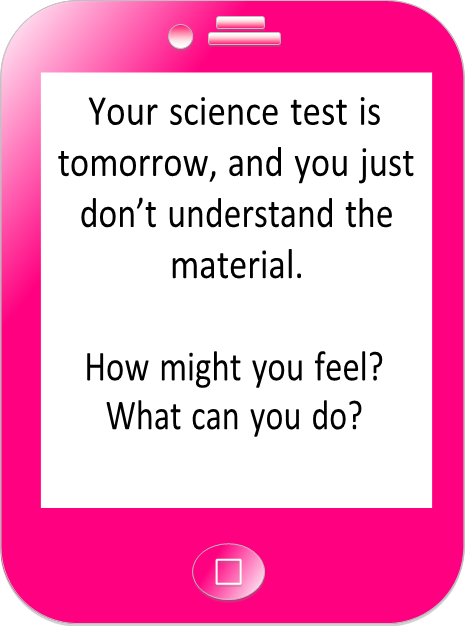 It’s your first day at a new school, and you’re
It’s your first day at a new school, and you’re
 not sure where to sit at lunch because you don’t
not sure where to sit at lunch because you don’t
know anyone.
How might you feel?
What can you do?
You’re working on a group project, but your group
 members aren’t putting in much effort.
members aren’t putting in much effort.
How might you feel?
What can you do?
You think your teacher
 made a mistake in grading your paper, and you want to tell them... but you don’t really like this teacher.
made a mistake in grading your paper, and you want to tell them... but you don’t really like this teacher.
How might you feel?
What can you do?

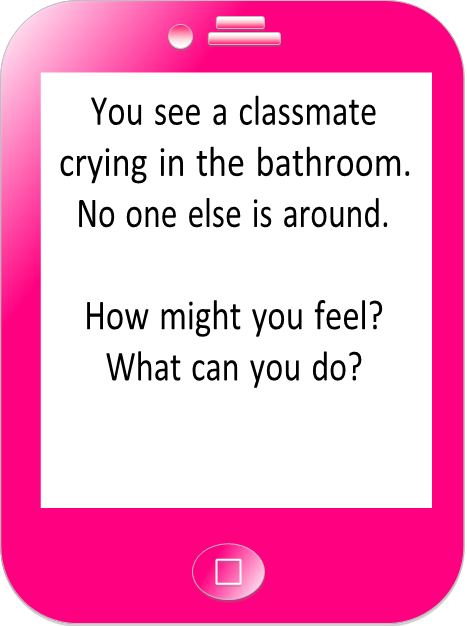 Your friend keeps posting pictures on Instagram that include you. You don’t like the way you look in the pictures.
Your friend keeps posting pictures on Instagram that include you. You don’t like the way you look in the pictures.
How might you feel?
What can you do?

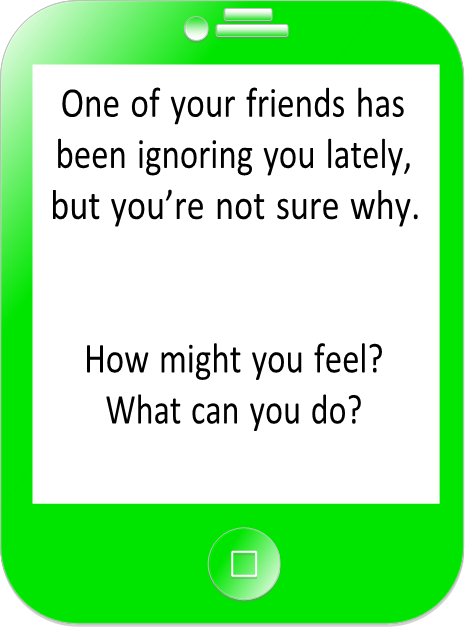 You’re getting hurtful texts from a number you don’t recognize. The
You’re getting hurtful texts from a number you don’t recognize. The
person refuses to reveal their identity.
How might you feel?
What can you do?
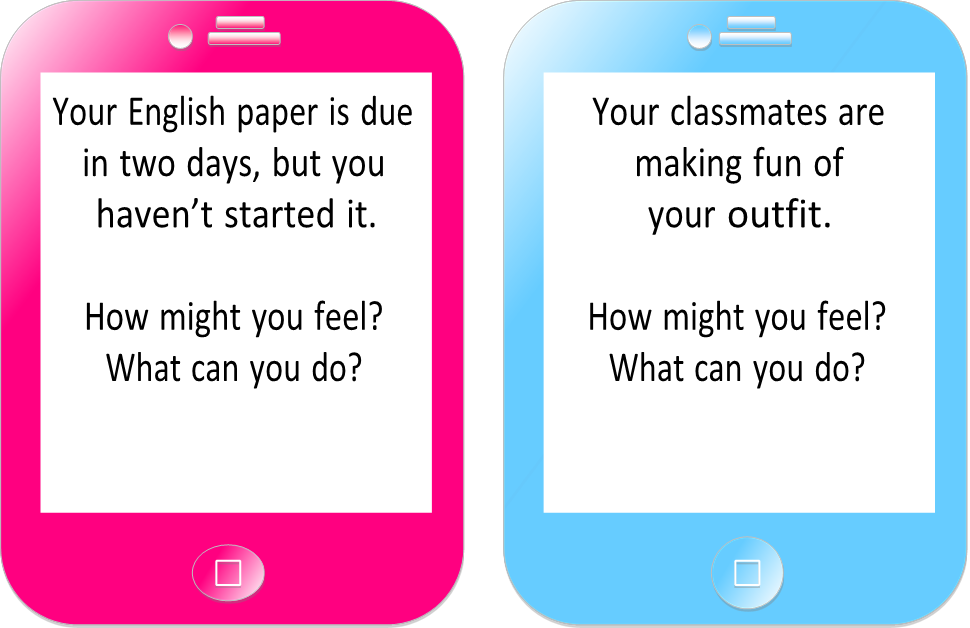
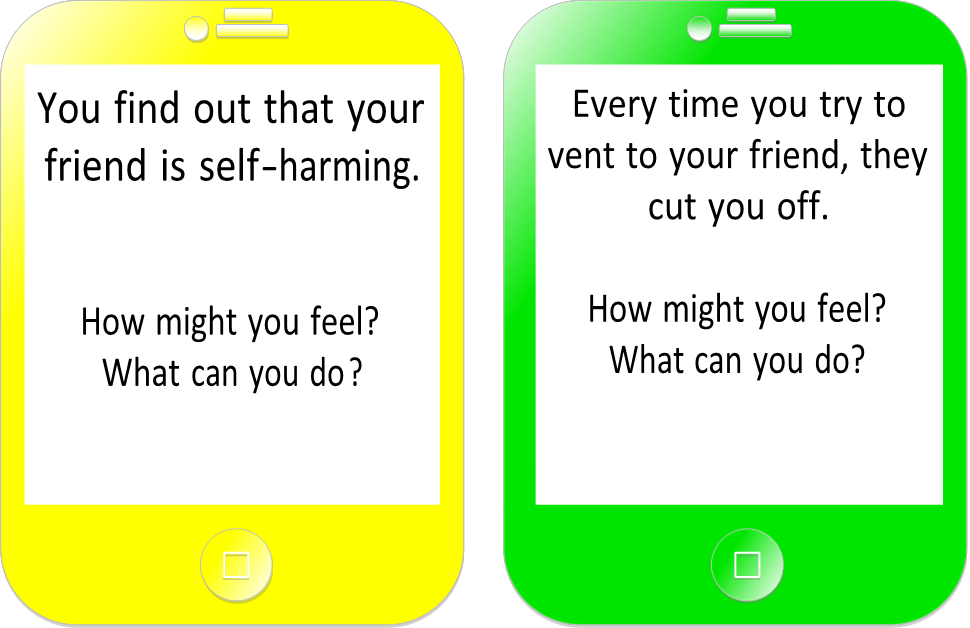
You accidently let it slip to a classmate that
 your friend has a crush on them. Your friend didn’t want you to tell anyone.
your friend has a crush on them. Your friend didn’t want you to tell anyone.
How might you feel?
What can you do?
 You’re trying to study for a test, but you’re having trouble
You’re trying to study for a test, but you’re having trouble
concentrating because
of racing thoughts.
How might you feel?
What can you do?
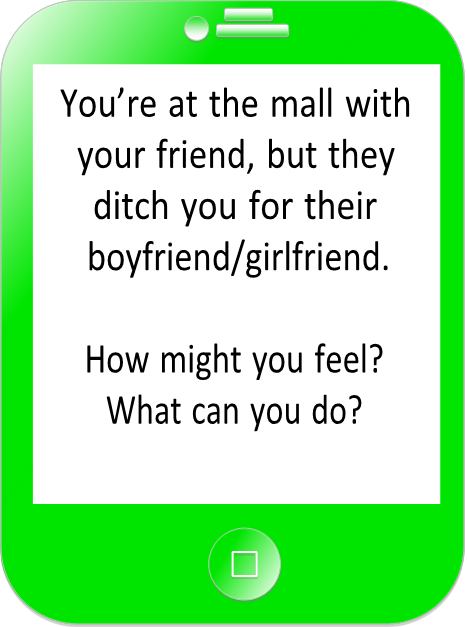 |
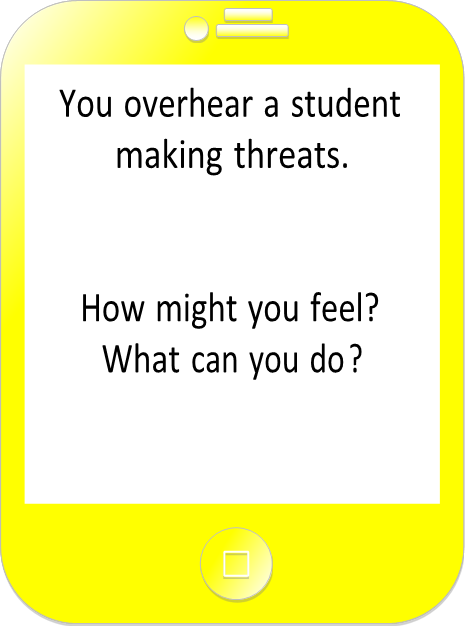
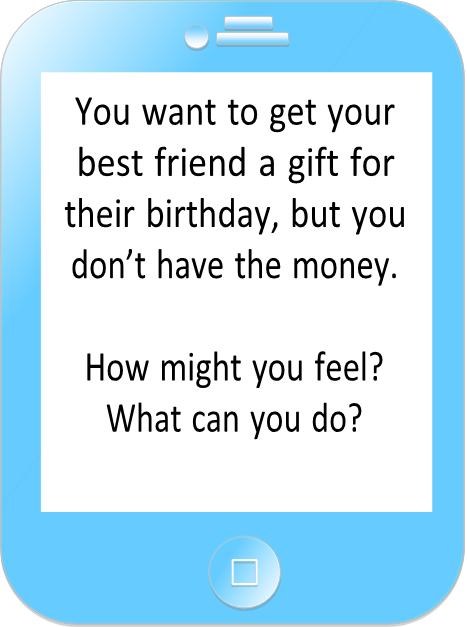 |
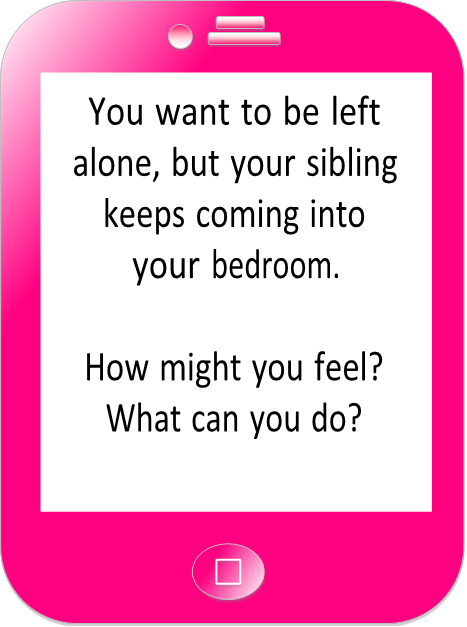

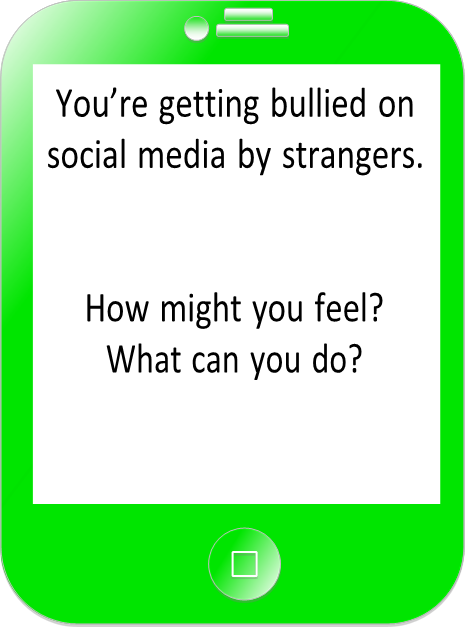 Your parents have been fighting a lot, and you don’t know why. They seem angry & annoyed lately.
Your parents have been fighting a lot, and you don’t know why. They seem angry & annoyed lately.
How might you feel?
What can you do?
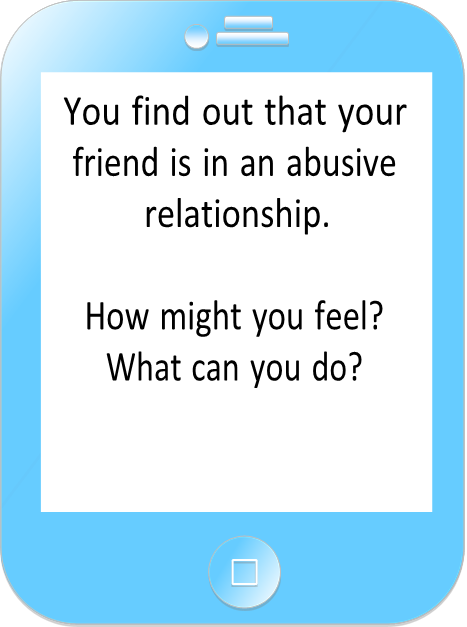 |
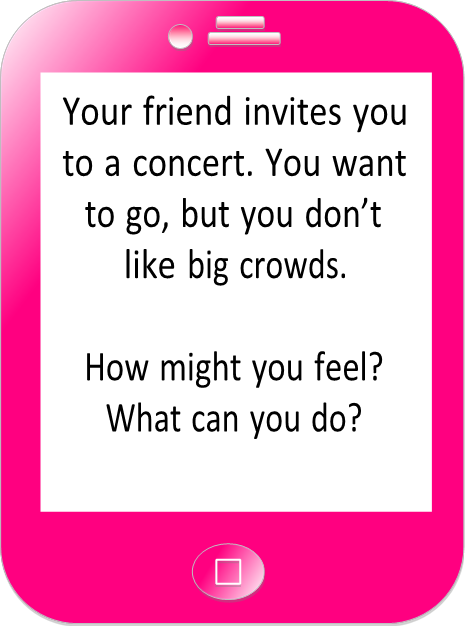
You’re going on an overnight field trip. You’re not friends with
 anyone in the class, and there are several cliques within the class. You’re not sure who to hang out with on this field trip, especially on the 6 hour bus ride.
anyone in the class, and there are several cliques within the class. You’re not sure who to hang out with on this field trip, especially on the 6 hour bus ride.
How might you feel?
What can you do?
 You’re at a party, and a stranger offers you a drink. Your friends are encouraging you to drink, but you’re not
You’re at a party, and a stranger offers you a drink. Your friends are encouraging you to drink, but you’re not
sure what’s in the cup.
How might you feel?
What can you do?

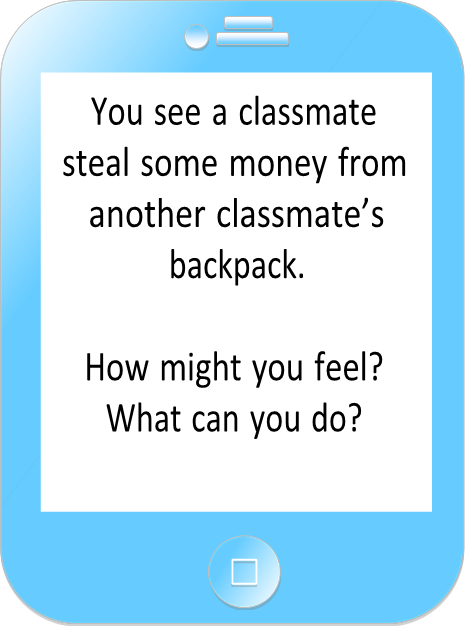 A classmate texts you that they have a crush on you. You just like
A classmate texts you that they have a crush on you. You just like
this person as a friend.
How might you feel?
What can you do?
You don’t have a date for
 Homecoming. You’re going with your friends, but
Homecoming. You’re going with your friends, but
they are all bringing dates.
How might you feel?
What can you do?
You notice that your friend has not been
 taking care of themselves lately. They look tired &
taking care of themselves lately. They look tired &
have poor hygiene.
How might you feel?
What can you do?
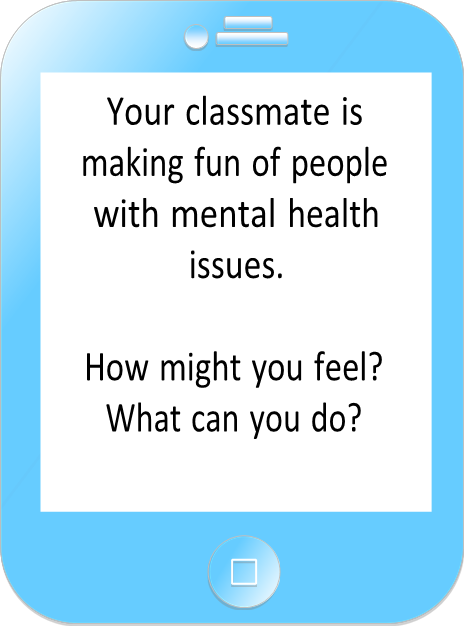 You’re at a party with your friend. They seem
You’re at a party with your friend. They seem
 intoxicated, but they’re supposed to drive
intoxicated, but they’re supposed to drive
you home.
How might you feel?
What can you do?

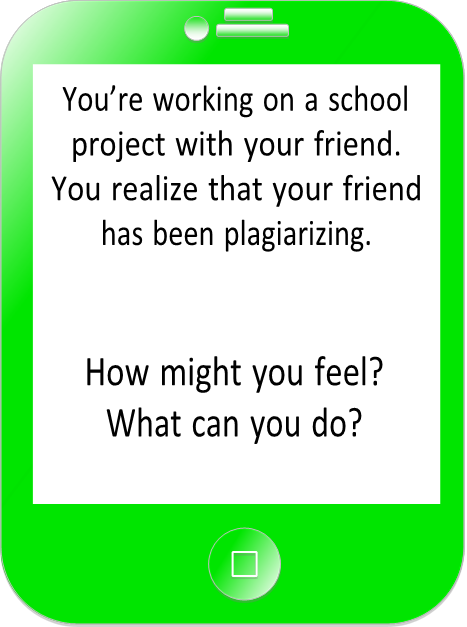 Your crush wants you to text them a picture of a sexual nature, but you know you’re not
Your crush wants you to text them a picture of a sexual nature, but you know you’re not
supposed to.
How might you feel?
What can you do?
You’re in class & about to take an exam, but

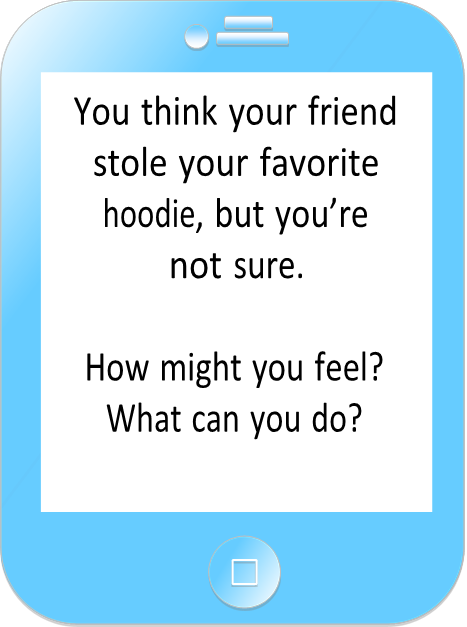 you don’t think you’re ready for it, even
you don’t think you’re ready for it, even
though you studied.
How might you feel?
What can you do?
Two of your friends are going on a trip for three days,
along with a third person
that you used to be friends with. You want to go with
 them, but you don’t like that third person anymore. How might you feel?
them, but you don’t like that third person anymore. How might you feel?
What can you do?
 You tell your friend about your crush. Two
You tell your friend about your crush. Two
weeks later, your friend
starts dating your crush!
How might you feel?
What can you do?
 A classmate sitting in the desk next to you always tries to cheat during
A classmate sitting in the desk next to you always tries to cheat during
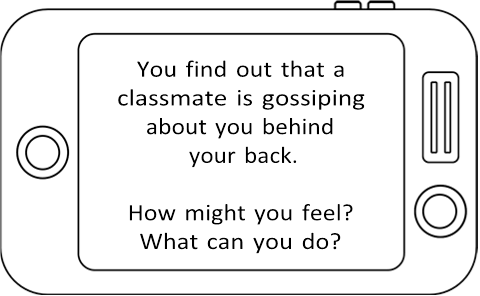 |
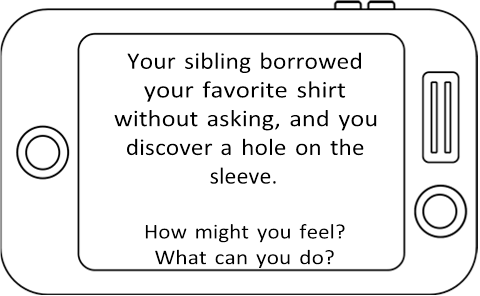 |
tests by looking at your paper.
How might you feel?
What can you do?
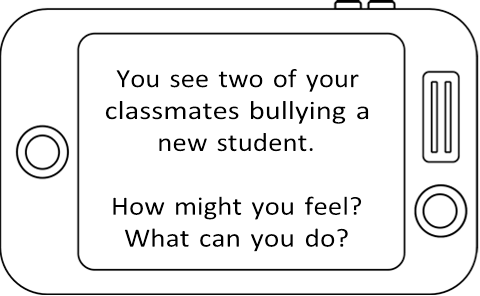
 Your science test is tomorrow, and you
Your science test is tomorrow, and you
just don’t understand
the material.
How might you feel?
What can you do?
It’s your first day at a new school, and you’re
 not sure where to sit at lunch because you don’t
not sure where to sit at lunch because you don’t
know anyone.
How might you feel?
What can you do?
 You’re working on a group project, but your group
You’re working on a group project, but your group
members aren’t putting
in much effort.
How might you feel? What can you do?
You think your teacher made a mistake in
 grading your paper, and you want to tell them...
grading your paper, and you want to tell them...
but you don’t really like this teacher.
How might you feel? What can you do?
You see a classmate crying in the
 bathroom. No one else is around.
bathroom. No one else is around.
How might you feel?
What can you do?
Your friend keeps posting pictures on Instagram
 that include you. You don’t like the way you look in the pictures.
that include you. You don’t like the way you look in the pictures.
How might you feel?
What can you do?
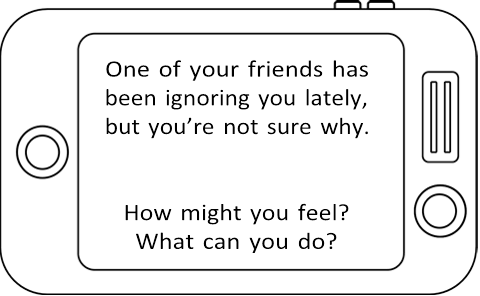 You’re getting hurtful texts from a number you don’t recognize. The
You’re getting hurtful texts from a number you don’t recognize. The
person refuses to reveal their identity.
 How might you feel? What can you do?
How might you feel? What can you do?
 Your English paper is due in two days, but
Your English paper is due in two days, but
you haven’t started it.
How might you feel? What can you do?
 You find out that your friend is self-
You find out that your friend is self-
harming.
How might you feel?
What can you do?
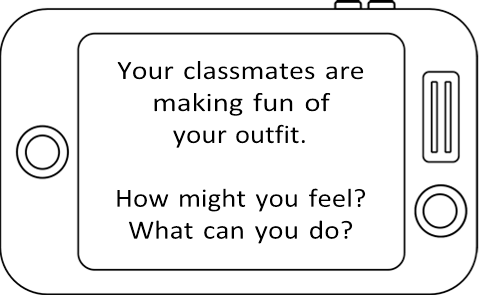
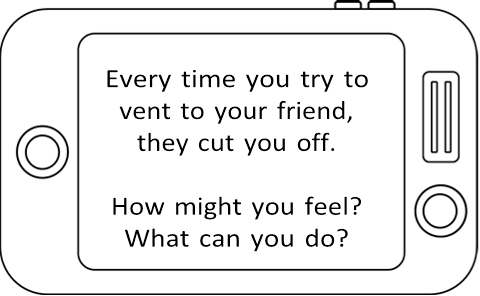
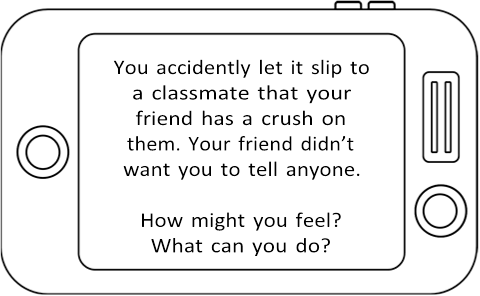 You’re trying to study for a test, but you’re having
You’re trying to study for a test, but you’re having
 trouble concentrating because of racing thoughts.
trouble concentrating because of racing thoughts.
How might you feel?
What can you do?
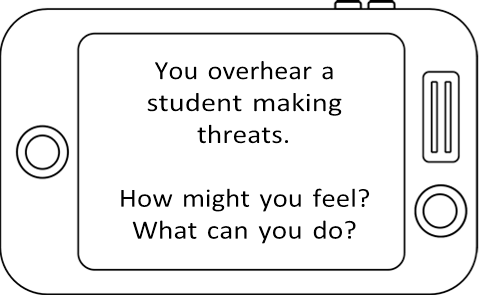
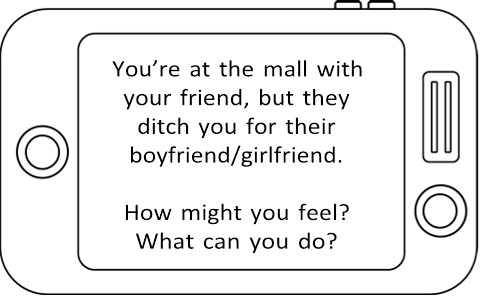

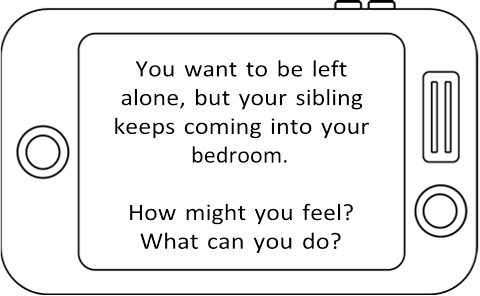 You want to get your best friend a gift for
You want to get your best friend a gift for
their birthday, but you
don’t have the money.
How might you feel?
What can you do?
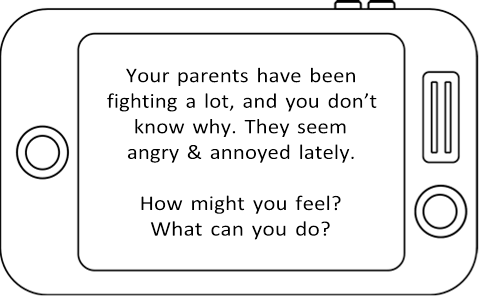
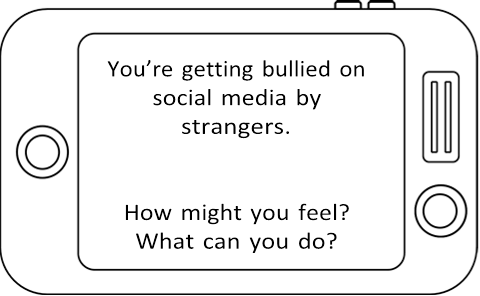

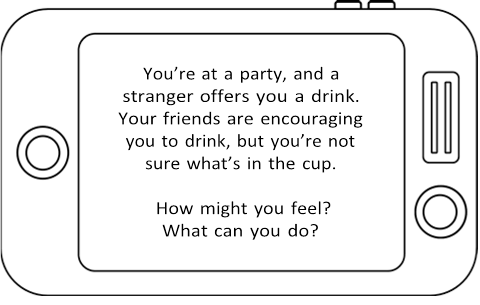 You’re going on an overnight field trip. You’re not friends with
You’re going on an overnight field trip. You’re not friends with
 anyone in the class, and there are several cliques within the class. You’re not sure who to hang out with on this field trip, especially
anyone in the class, and there are several cliques within the class. You’re not sure who to hang out with on this field trip, especially
on the 6 hour bus ride.
How might you feel?
What can you do?
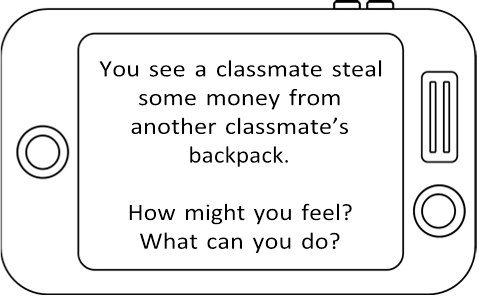 A classmate texts you that they have a crush
A classmate texts you that they have a crush
 on you. You just like this person as a friend.
on you. You just like this person as a friend.
How might you feel?
What can you do?
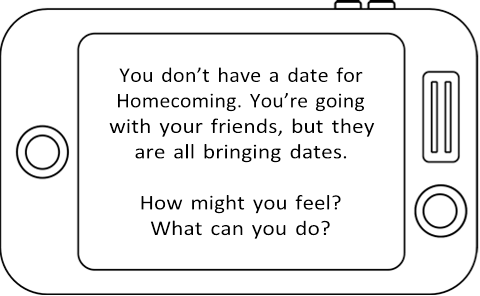
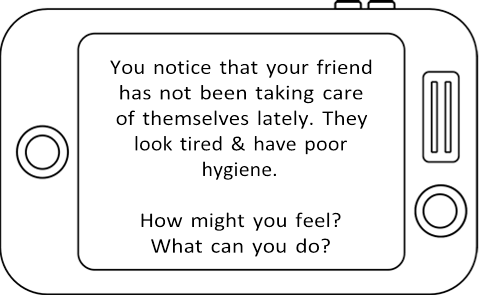

 You’re at a party with Your classmate is your friend. They seem making fun of people intoxicated, but they’re with mental health supposed to drive you issues. home.
You’re at a party with Your classmate is your friend. They seem making fun of people intoxicated, but they’re with mental health supposed to drive you issues. home.
How might you feel? How might you feel? What can you do? What can you do?


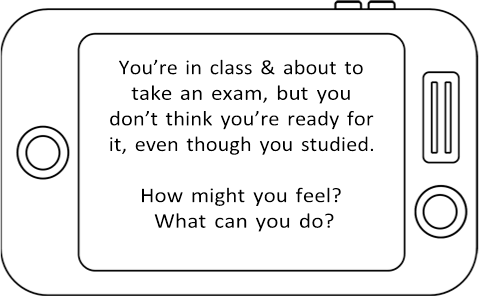 You think your friend stole your favorite
You think your friend stole your favorite
hoodie, but you’re not sure.
How might you feel?
What can you do?

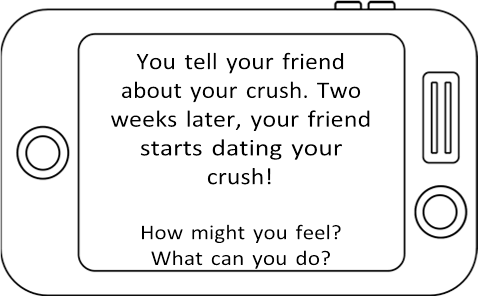 Two of your friends are going on a trip for three days, along with a third person that you used to be friends with. You
Two of your friends are going on a trip for three days, along with a third person that you used to be friends with. You
want to go with them, but you don’t like that third
person anymore.
How might you feel?
What can you do?
Study the words that are connected with youth.

Adolescence - the period of time in a person's life when they are developing into an adult;
Delinquent - a person, usually young, who behaves in a way that is illegal or not acceptable to most people;
Grow up - to gradually become an adult;
Generation gap - a situation in which older and younger people do not understand each other because of their different experiences, opinions, habits, and behaviour;
Street/abandoned children - children left without care and protection;
Teenager - a young person between 13 and 19 years old;
Teen period - the period in which people are aged between 13 and 19;
Juvenile - relating to a young person who is not yet old enough to be considered an adult;
Youth - the period of your life when you are young, or the state of being young;
Youth organizations - a group of people who work with teens in an organized way for a shared purpose;
Youth leadership - the set of characteristics for young people that make them good leaders.
Examples:
She had a troubled adolescence.
Taking responsibility for yourself is part of the process of growing up.
She's a young politician who manages to bridge/cross (= understand both groups in) the generation gap.
The magazine is aimed at teenagers and young adults.
I was a fairly good football player in my youth.
To speak about youth problems, you need the appropriate vocabulary.

Urgent - needing attention very soon, especially before anything else, because important;
Important - necessary or of great value;
Serious - severe in effect; bad;
Awful - extremely bad or unpleasant;
Shocking - a sudden, unexpected, and usually unpleasant;
Difficult to solve - not easy to find a way out;
Family problems - difficult situation, conflicts with the members of your family;
Personal problems - difficulties that you have in your personal life;
School problems - conflicts, difficult situations at school;
Violence - actions or words that are intended to hurt people;
Cruelty - cruel behaviour or a cruel action;
Drug addiction - addiction to natural or artificially made chemical that is taken for pleasure, to improve someone's performance of an activity, or because a person cannot stop using it;
Drinking problems - problems with alcohol, addicted to hot drinks;
Poverty - the condition of being extremely poor;
Discrimination - treating a person or particular group of people differently, especially in a worse way from the way in which you treat other people, because of their skin colour, sex, sexuality, etc;
Loneliness - the state of being lonely.
Examples:
Many people are in urgent need of food and water.
This is a very serious offence.
Teens face with drinking problems very often.
Loneliness is the main problem in teens’ life.
To speak about youth life and their problems, you need the appropriate vocabulary. Part 1

Experience - (the process of getting) knowledge or skill from doing, seeing, or feeling things;
Innocence - the fact that someone is not guilty of a crime;
Naivety - trust based on not having much experience;
Active - busy with a particular activity;
A couch potato - a person who watches a lot of television and does not have an active life;
Rebel - to refuse to obey rules or people in authority;
Disobey - to refuse to do something that you are told to do;
Ideals - principles or a ways of behaving that is of a very high standard;
Defy - to refuse to obey a person, decision, law, situation, etc;
Irresponsible - not thinking enough or not worrying about the possible results of what you do;
Challenge - something that needs great mental or physical effort in order to be done successfully and therefore tests a person's ability;
Ignore - to intentionally not listen or give attention to;
Fashion - a style that is popular at a particular time, especially in clothes, hair, make-up, etc.
Examples:
Do you have any experience of working with kids? (= Have you ever worked with them?)
She pleaded her innocence, but no one believed her.
I think her naivety is charming - she's so unspoilt and fresh.
You have to try to keep active as you grow older.
Jacob rebelled against his parents' plans for him and left school at the age of 16.
To speak about youth life and their problems, you need the appropriate vocabulary. Part 2

Urban - of or in a city or town;
Vandalism - any activity that is considered to be damaging or destroying something that was good;
Offender - a person who is guilty of a crime;
Idolize - to admire and respect someone very much, often too much;
Fan - someone who admires and supports a person, sport, sports team, etc;
Copy - to behave, dress, speak, etc. in a way that is intended to be like someone else, for example, because you admire that person;
Revere - to very much respect and admire someone or something;
Respect - to feel or show admiration for someone or something that you believe has good ideas or qualities;
Worship - to love, respect, and admire someone or something very much, often without noticing the bad qualities of that person or thing;
To confide - to tell something secret or personal to someone who you trust not to tell anyone else;
Take up smoking - start smoking;
Examples:
The advertising industry's use of classic songs is vandalism of popular culture, he said.
She idolized her father.
He's a great fan of country music.
He tends to copy his brother in the way he dresses.
As a child, I worshipped my older brother.
To speak about teens’ problems, you need the appropriate vocabulary.

To quarrel - to disagree with someone in an angry, often loud way, also quarrel - the noun
To be at odds - to disagree;
Support - to agree with and give encouragement to someone or something because you want him, her, or it to succeed;
Issue - a subject or problem that people are thinking and talking about;
Trust - to believe that someone is good and honest and will not harm you, or that something is safe and reliable;
To tease - to laugh at someone or say unkind things about them, either because you are joking or because you want to upset that person;
To bully - to hurt or frighten someone who is smaller or less powerful than you, often forcing that person to do something they do not want to do;
Accident-prone - a person often has accidents, usually because they are very awkward;
Dress up - to put on special clothes in order to change your appearance;
To cope with - to deal with problems or difficulties, especially with a degree of success;
Deny - to say that something is not true.
Examples:
They're at odds over the funding of the project.
The majority of people in the town strongly support the plans to build a new school.
Trust me - I know about these things.
Little kids usually love dressing up in their mothers' clothes.
To speak about generation gap, you need the appropriate vocabulary.

View - an opinion, belief, or idea, or a way of thinking about something;
Relationship - the way in which two things are connected;
Regard - to consider or have an opinion about something or someone;
Prevent - to stop something from happening or someone from doing something;
Wise - having or showing the ability to make good judgments, based on a deep understanding and experience of life;
False - not real, but made to look or seem real;
Wisdom - the ability to use your knowledge and experience to make good decisions and judgments;
Disappear - to no longer exist;
Express - to show a feeling, opinion, or fact;
Advice - an opinion that someone offers you about what you should do or how you should act in a particular situation;
Settle - to reach a decision or an agreement about something, or to end a disagreement;
Blame - to say or think that someone or something did something wrong or is responsible for something bad happening.
Examples:
Do you have any views about/on what we should do now?
Her relationship isn't good with her father, but she's very close to her mother.
Her parents always regarded her as the smartest of their children.
This is a way of life that is fast disappearing.
To speak about teenagers, you need the appropriate vocabulary.

Afford - to be able to buy or do something because you have enough money or time;
Unrequited love - if love that you feel for someone is unrequited, it is not felt in the same way by the other person;
Increase - to (make something) become larger in amount or size;
Middle age - the period of your life, usually considered to be from about 45 to 60 years old, when you are no longer young, but are not yet old;
Spoil - to destroy or reduce the pleasure, interest, or beauty of something;
Concern - to cause worry to someone;
Chore - a job or piece of work that is often boring or unpleasant but needs to be done regularly;
Uncertain - not knowing what to do or believe, or not able to decide about something;
Fearful - frightened or worried about something;
Sober - not drunk or affected by alcohol;
Possibility - a chance that something may happen or be true;
Subculture - the way of life, customs, and ideas of a particular group of people within a society that are different from the rest of that society;
Unprotected - not protected and therefore able to be harmed or damaged.
Examples:
I don't know how he can afford a new car on his salary.
It's just another poem on the pain of unrequited love.
Once you reach middle age, you have to be sensible about your health.
He tried not to let the bad news spoil his evening.
He hesitated before calling her, fearful of what she might say.
To speak about teens’ groups, you need the appropriate vocabulary.

Solidarity - agreement between and support for the members of a group, especially a political group;
Like-minded - share the same opinions, ideas, or interests;
Distinct - clearly noticeable; that certainly exists;
Hippy - a person, typically young, especially in the late 1960s and early 1970s, who believed in peace, was opposed to many of the accepted ideas about how to live, had long hair, and often lived in groups and took drugs;
Identity - who a person is, or the qualities of a person or group that make them different from others;
Charity - a system of giving money, food, or help free to those who are in need because they are ill, poor, or have no home, or any organization that has the purpose of providing money or helping in this way;
Message - idea;
Opposed - completely different;
Startling - surprising and sometimes worrying;
Associate - to connect someone or something in your mind with someone or something else;
Goth - someone who likes goth music and wears black clothes and white make-up;
Punk - a person who wears punk clothes and likes punk music;
Biker - a member of a group of people riding motorcycle;
Raver - someone who goes to a rave (= an event where young people dance to modern electronic music and sometimes take illegal drugs);
Emo - a young person who likes this music, wears mainly black clothes, and is often nervous, worried, and unhappy;
Hipster - someone who is very influenced by the most recent ideas and fashions.
Examples:
There's a distinct smell of cigarettes in here.
I cannot reveal the identity of my source.
He made some startling admissions about his past.
Problems of Young People
Remember that there are synonyms for the word:
teenagers = young people = the young = the youngsters
parents = adults = grown-ups
youth (молодость) — the youth (молодежь)
1. The Problem of Misunderstanding with Parents or Teachers
Remember that the cause of misunderstanding in a family is generation gap. Generation gap is difference in years.
Words to know: complain, accept, be questioned, generate, dissatisfy, warning, make up, encourage, express their identity — выражать свою индивидуальность
Problems with parents. Personal problems can look silly and unimportant to the eyes of grown-ups, who have already passed this period. These problems are caused by generation gap. Every generation is unique in its experience. It has its own ideals and a system of values. Adults always complain that the young are not always what they were. These words are repeated from generation to generation. That’s correct. In fact today the young are better educated. They grow up more quickly. They have more freedom. At present the young do not blindly accept the ideals of their parents. They don’t believe that they are right only because they are older. But the adults don’t want their values to be questioned. All these differences generate a generation gap when the young and adults don’t understand one another.
As a rule, the adults dissatisfied with their own life, teach the young how to live. Unfortunately they apply old standards to the new way of life. But the young people don’t want to live in the past. They have their own ideas. They want to make their own mistakes rather than to listen to the warnings of the adults and repeat the mistakes of the older generation. They want to overcome their own difficulties. But grown-ups try to keep teenagers away from all the “dangers”, which makes up life.
Problems with teachers. The same misunderstanding we face sometimes from the side of the teachers. They think that youth is given for studying. However, school takes all teenagers’ time but the person who only studies is dull.
Another problem is bad marks. Bad marks don’t encourage weak students, they simply can’t do better. Also bad marks can cause problems with parents as they don’t want to understand that their child does his (her) best.
Young people need to be taken seriously. As long as parents and teachers can’t take teenagers seriously, they form their own social groups. So, many teens belong to different subcultures. The members of these youth groups express their own identity (themselves) through clothes, appearance, behavior and music they listen to. They have their own values and beliefs.
1.1. Express your opinion on the points. Give good reasons or examples from your life.
- there is always some sense in parents words;
- the best way to solve problems with parents is to talk peacefully;
- that the best tactics is not to contradict the parents.
1.2. Answer the questions.
- Do you often quarrel with your parents?
- Do you have much in common with your parents?
- Do you always understand your parents? Do they understand you? What are the reasons of misunderstanding?
- Do your parents help you to solve your problems?
2. The Problem of Communication / Problem with Friends
Words to know: to socialize, entertainment, opportunity, to bully, a bully, hurt, victim, pick on — приставать, avoid — избегать, stand up for — защищать, abuse – жестоко обращаться, threaten — угрожать, tease — дразнить, cause harm – причинять вред
Communication has always been an important part of young people’s life. It is very difficult to be on good terms (get on) with everybody as all people are different. Sometimes teenagers don’t feel comfortable in a group because they are too shy or not very strong. But every human needs to socialize and it is the reason why they prefer different ways of communication.
Today teenagers can choose between traditional and new ways of communication. Traditionally they meet after classes with their school friends, make parties, go to the cinema or disco clubs to have fun, relax and make new friends.
But if the young people do not like noisy clubs and other places of entertainment, they can find friends without leaving their homes – the Internet gives them such an opportunity. They can sit for twenty hours chatting with their friends.
2.1. Express your opinion on the points. Give good reasons or examples from your life.
- It is a problem to choose good friends.
- There can be only two or three real friends.
- «Friends are thieves of time» (an English proverb).
2.2. Answer the questions.
- What makes people friends?
- Do you spend much time with your friends? What do you usually talk about?
- Do you know about your friend’s problems? Do you try to help?
- What do you value in your friends?
3. The Problem of Addiction / Health Problems
Words to know: addiction, unability, properly, curiosity, sensations, on the contrary, undermine, lively, listless, detached — отстраненный, dependence, injection — инъекция.
Every type of addiction is dangerous for a personality. For an addiction we mean the unability to stop doing actions that are harmful for health.
Let us take for example, computer games. Nowadays many young people are keen on computer games. Such young people don’t eat, sleep, work or learn properly. It’s a great problem and parents don’t know how to make them get interested in a real life.
The tragic effect of drug-addiction is experienced by millions of people. The use of drugs starts at school, at parties, in discotheques, etc, when youngsters are no more than 15 to 17 years old. Often they make their first “try” out of curiosity – or so as not to be “different” from their “mates”. They want to get new, unexpected sensations, they hope it will stimulate their imagination and creative abilities. But, on contrary, drugs actually undermine creativity.
As a result of regular use of drugs an active and lively personality turns into a listless person, lacking in energy and without any interests. Life becomes focused on the need to get and apply drugs. It means that the total personality becomes influenced by the regular use of drugs. The addict gradually loses his or her better moral characteristics, becomes detached from friends and family. Drugs don’t mean enjoyment, they mean dependence. And it is too late when all the victims realize it. It can take a year or six months for that “dependence” to develop – but more often, just a month or two. Sometimes a person can become addicted after just one injection.
Young people can have health problems caused by smoking or drinking beer. They do it to look older and more independent.
3.1. Comment on the following.
- If you are keen on computer games, you have lost interest in a real life.
- If you are keen on computer games, you don’t have any friends.
- Only weak people can be addicted.
3.2. Составьте несколько предложений по проблеме наркомании, используя конструкцию Complex Subject.
ОБРАЗЕЦ Drug addiction is said to be experienced by 30 millions of Russia’s population.
4. Problem of Love
Words to know: stable relations, inexperienced, pregnancy — беременность, a proposal — предложение руки, break down — распадаются.
The problem of love is very important for young people. They believe that love can last forever. They think that desire and passion in love are enough. Unfortunately, often their hearts are broken. Young people are not always ready to have stable relations. In many cases they are too young and inexperienced to begin a family life.
Sometimes their relationships lead to early marriages and teenage pregnancy. But young people do not realize responsibilities when make a proposal of marriage. Early marriage, pregnancy and upbringing a baby can destroy their career plans, prevent from fulfilling their dreams. Only few marriages in youth end up happily. The majority of them break down in a year or two.
4. Answer the questions:
- Do you believe in «love with first sight»?
- Do you think that love at this age can be true?
- What should young people do if they love each other? Should they be together or wait until their coming of age (совершеннолетия)?
5. Problem of Choosing Future Profession / Problem of Education
Words to know: educational institution — образовательное учреждение, graduate — выпускник, poor-paid position — плохо-оплачиваемая должность, good score — хороший балл, suitable — подходящий
Read more texts about choosing future profession
The problem of education is also very serious. There are educational institutions at present but the quality of education is different. Some of are state, some are private. Some are difficult to enter, others are easy to enter. Some of them prepare specialists who can easily find a prestigious and well-paid job, others offer their graduates only poor-paid positions.
The choice of the educational institutions depends on the school you study at, your parents, the financial conditions of the family, your likes and dislikes. But everbody has to study hard because to enter a good institute they must have good score on their exam test.
It is a great problem to find a suitable institute and a profession for the rest of your life. But it is very important as making the wrong choice will influence your future life.
5. Answer the questions:
- Why is it important to make the right choice while choosing future profession?
- Why is it difficult?
- Would you like to get a good education? Why?
- Is it necessary to study hard at school to make a successful career? Why or why not?
6. Problem of Pocket Money
Изучить английские слова по теме «Money»
The problem of money is important as well. Young people need to have pocket money for buying things for themselves, for example discs, fashion clothes, etc. As a rule, parents give their children money for food and clothes. However, in large families children have to work to pay for extra clothes, things necessary for hobbies, etc.
6. Answer the questions:
- Do you have enough pocket money for your needs?
- Is it your parents who give you pocket money?
- What do you spend your pocket money on?
- Have you ever tried to earn money? What did you do?
7. Bulling
Words to know: to bully, a bully, hurt, victim, pick on — приставать, avoid — избегать, stand up for — защищать, abuse – жестоко обращаться, threaten — угрожать, tease — дразнить, cause harm – причинять вред
Bulling is a problem which is wide-spread at schools and in neighbourhoods.
A bully is anyone who feels powerful when they hurt or pick on someone else. They do not need a reason, just a victim to tease, threaten, cause harm or abuse. If you are a victim of a bully, there are a few things you can do:
- Avoid the bully whenever possible. Walk or run away from the bully.
- Ask your friends to stick close. It is harder to pick on someone when they have friends standing up for them.
- Ask an adult (parent, teacher or counselor) for help.
- Be brave and firm. Tell the bully to stop picking on you, that you do not like it and will report the abuse if it continues.
If you see someone else being bullied, don’t get in the way; you could be hurt. Find an adult to help ASAP (As Soon As Possible).
7. Answer the questions:
- Is there bullying in your school?
- Have you ever been bullied?
- Have you ever seen someone been bullied? What did you do?
- What do you think is the best way to stop a bully? Give a talk on the problem.
8. «Problems of the Youth» (подведение итога)
1. Give a talk on the yough problems, using the table.

2. Answer the questions:
- What are the most common problems of young people?
- Do you share the opinion that problems can make people stronger?
- Do your friends have the same problems as you?
- Is it possible to solve your problems by yourself?
- What is the best way to solve the problems?
3. Повторите слова на тему «Laws of Co-existence»
1. respect each other, listen to each other, talk to each other, observe the laws of co-existence, deserve somebody’s love, get on well with, argue with ach other, quarrel each other, need badly, get rid of, do without;
2. fair — unfair, possible- impossible, dependent — independent, different — indifferent;
3. to argue — argument, to discuss – discussion, to resolve — resolution, to depend — dependence/ independence, a quarrel — to quarrel, to a value — to value, a cause — to cause;
4. lead to fights, bad relationship, violence, unfair punishments, be involved in conflict, cause the conflict, different values, prevent conflicts, the right to disagree, the right to be different, be tolerant, resolve a conflict, conflict resolution, in a peaceful way, discuss the situation.
Teenage problems. Упражнения (уровень 1)

1. Problems with Parents
Упражнение 1. Answer the questions and give your reasons: Why or why not?
allow – разрешать
let – разрешать (синоним; используется только в дейст. залоге)
make – заставлять
1) Do you think all teenagers have problems?
2) Do you get along with your parents?
3) Do your parents let you go out in the evening? Why or why not?
4) Do your parents allow you to invite your friends home? Why or why not?
5) Are you allowed to have a pet? Why or why not?
6) Are you allowed to watch TV late at night? Why or why not?
7) Are you happy with your life?
Упражнение 2. Finish the sentences.
1. My mother makes me ….
2. My grandmother lets me…
3. My father doesn’t allow me to …
4. I am allowed to …
5. I am made to …
Упражнение 3. Solve the crossword.
- страдать
- ссориться
- убеждать
- спорить
- обменивать
- мечтать
- уважать
- вести себя
- осознавать
- доказывать

Ответы к некоторым упражнениям вы найдете в конце урока!
Упражнение 4. Translate the adjectives and answer the questions.
- What are your parents like?
- What are you like?
sensible, conservative, strict, dependent, independent, obedient, kind, hardworking, lazy, rude
Запомните новые прилагательные: indulgent — потворствующий, indifferent — безразличный, considerate — чуткий
2. School Problems
Упражнение 5. What is school for you?
- a place where you make friends:
- a place which help you to find a good job in future;
- a place where children make fun;
- a place where you get knowledge;
- a place where you write tests and take exams.
Упражнение 6. What don’t you like about your school? What is your idea of a perfect school?
1. Write about the building, timetable (time the lessons start and finish, the breaks, the number of lessons a day, subjects), uniform, rules/ discipline.
2. Start like this: To my mind, a perfect school should be / have…
3. Use the phrases:
1. brightly decorated/ gloomy building — красиво раскрашенное/ мрачное здание
2. modern/ typical building — современное/типичное здание
3. offer any subjects students are interested in — предлагать любые предметы, которые интересуют учащихся
4. have no boring and useless subjects — не имеют скучных и бесполезных предметов
5. have no special uniform — нет формы
6. prepare for real life — готовят к реальной жизни
7. listen to students’ opinion — прислушиваются к мнению учащихся
8. treat each other with respect — общаются друг с другом с уважением
9. have no tests — не проводят тесты
10. have good/ bad discipline at the lessons such as… — на уроках … хорошая/ плохая дисциплина
Полный список английских слов по теме «School».
3. Pocket Money
Упражнение 7. Make up 10 sentences on the table.
Повторить английские слова по теме «Money»
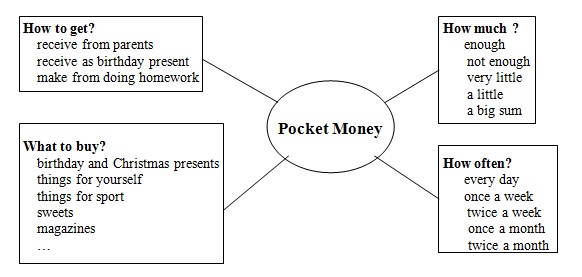
* * *
Problems with parents, school and pocket money are quite common for every teeanger. The best way to solve these problems, try to talk about it with one of your parents. You may think they won’t understand you, but you should try. Ask them how they felt when they were teenagers. They probably experienced many of the same feelings you are having now. Remember that your parents will be always very pleased that you are going up.
* * *
Teenage problems. Упражнения (уровень 2 — intermediate)
1.2. Problems with Parents
Упражнение 8. Do you know these words on the topic «Misunderstanding in a Family»? Make up 10 sentences.
to misunderstand, cause misunderstanding, the causes of misunderstanding, generation, generation gap, freedom, independence, justice, respect, family reunion (10);
Упражнение 9. What do you think is the common reason of family quarrels? Write the statements in order of importance. Give your own example.
1. unfair punishments
2. unequal rights
3. too many responsibilities
4. lack of independence (dependence on parents)
5. bad behavior/ disobedience
Use the words: obey, ignore, refuse, refuse to help, refuse to share, refuse to obey, answer back.
Повторить английские слова по теме «Household chores». Список №2 (intermediate)
Упражнение 10. Translate into English.
1. Учитель заставляет ее говорить по-английски на уроке английского.
2. Что побудило тебя написать ему письмо?
3. Мама хочет, чтобы он сходил в магазин.
4. Ты хочешь, чтобы я помог тебе?
5. Почему ты это сказал?
6. Ему не на кого положиться.
7. Мы против несправедливых наказаний.
8. Я ненавижу, когда меня высмеивают.
9. Я не могу поладить с старшей сестрой.
10. Какие проблемы есть в твоей семье?
ОТВЕТЫ
Упражнение 11. Fill the gaps with your own words.
These are the usual reasons of family quarrels:
• clothes
• marks
• behavior
• pocket money
1. I prefer wearing…..but my mother wants me to look more ….
2. I try to do my best at school but my parents aren’t … with my marks.
3. I am not …. to go out late at night.
4. I always ask for …. when I want to …. my friends home.
5. My parents don’t let me to watch …. programmes on TV.
6. They … me like a child. I am so depressed about it.
7. I need … money to buy… But my parents don’t allow me to get a job.
ОТВЕТЫ
Упражнение 12. Translate the sentences with Complex Object. Make sure that you know the words in bold. Make up your own sentences with them.
1. Parents want their children to respect them.
2. Parents don’t want their children to ignore them.
3. Children don’t want their parents to shout at them.
4. Children don’t want their parents make fun of them.
5. Parents don’t let their children make fun of each other.
6. Teenagers don’t want to be dependent on parents.
7. Parents want their children to be independent.
8. All people want to have somebody to rely on.
9. All children want to have somebody to talk to.
10. His father wants us to obey him.
11. Her father wants her to have too many responsibilities.
12. Our mother doesn’t want us to quarrel with each other.
13. Our mother wants us to live in peace.
Упражнение 13. Translate the sentences with Complex Object. Make sure that you know the words in bold. Make up your own sentences with them.
1. I want him to give me advice.
2. I don’t want you to argue with me.
3. I expect her to advise me how to solve the problem.
4. All parents expect their children to obey them.
5. His father advised us to share the TVset.
6. Mother makes her children tidy up their room.
7. His classmate refused to help.
8. She has nobody to talk to.
9. They have nobody to rely on.
10. I expect all people to have equal rights.
11. She doesn’t want them to depend on her.
12. I don’t want us to have an argument.
13. I expect us to discuss the situation.
2.2. School Problems
Упражнение 14. Answer the questions.
1. What don’t you like about your teachers?
2. Do your classmates have problems with teachers in your school?
3. What is the most common reason?
4. Do teachers punish students in your school? What for?
5. What kind of punishment do they use?
6. Should a teacher be strict enough?
7. Should a teacher have a sense of humour?
8. Should a teacher try to make the lessons motivating?
9. Can a teacher shout at the students?
10. What is your idea of a perfect teacher?
Упражнение 15. Express your opinion about a perfect teacher.
1. Use the words: be late for classes, make noise at the lessons, give bad marks, argue with, get on well with, make fun of, be polite, have a sense of humour, behave badly, punish, miss classes.
2. Start like this: To my mind, a perfect teacher should be / have / do / allow ….
Упражнение 16. Give a definition.
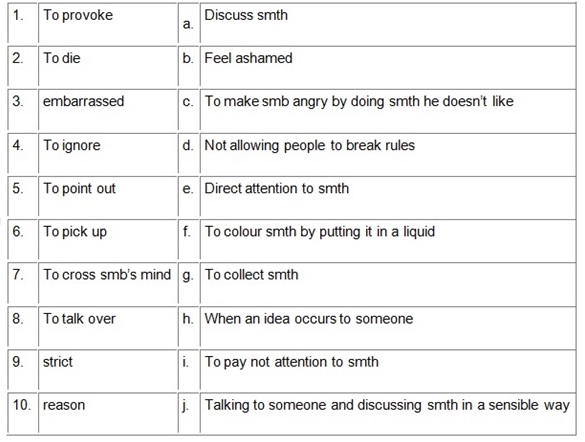
Упражнение 17. Fill in the gaps with the words: to provoke, to dye, to ignore, embarrassed, to point out, to pick up, to cross smb’s mind, to talk over, strict
1. She chose… all their rules.
2. Whenever I… …that all my friends had Saturday jobs, they replied , «We do not care what they do».
3. This just made her parents very …. .
4. I knew I was going to be really …when my father came… … me… .
5. This made me so angry that I did whatever I could …them.
6. I … my hair white blonde.
7. It never … my …that they were probably just worried about me.
8. I agreed to go home and …things …with my father.
3. Fashion
Remember the words. What is a good or bad taste in fashion? Do you care what to wear?
1. look lovely/ wild / defiant — выглядеть мило/ дико / вызывающе
2. wear torn jeans/ high-heel shoes — носить рваные джинсы / туфли на высоком каблуке
3. wear heavy make up — быть сильно накрашенной
3. fashionable/ stylish/ trendy — модный / стильный / ультрамодный
4. old-fashioned/ torn/ shabby — старомодный / рваный / поношенный
5. casual / smart — повседневный / нарядный
5. It depends. — Когда как.
6. It depends on the occasion. — Это зависит от мероприятия.
7. for going out – на выход
8. have modern haircut, dyed (colored) hair — иметь модную стрижку / крашеные волосы
9. follow fashion — следовать моде
10. wear the same style clothing as your friends do — носить такой же стиль, что и друзья
11. match the popular idea of beauty — соответствовать популярному представлению о красоте
12. show off your wealth by wearing rich outfits (наряд) — кичиться богатым нарядом
13. show off independence by … — казаться независимым путем …
Повторить английские слова по теме «Clothes. Fashion»
Упражнение 18. Express your opinion on fashion.
1) Fashion is my passion: ( I enjoy…, I hate it when…., I prefer…., I am sure…., If I had…..)
2) Clothes do not make the man, but…..(I like if people…., My friends….., Fashion….., To follow fashion……, It’s more important…..,To be honest…. If I had…..)
3) I don’t care what to wear. (I don’t care ….., More than that….., I think….., It’s not a problem….., Besides….., Who cares…., If I had…..)
* * *
4. Health Problems. Addiction
Упражнение 19. Read the talk and translate the words from Russian into English.
Talk about Computers
Helen: Computers are doing a lot of … (вред). We begin to forget how … (занимать) our … (свободное) time. For instance, we … (имели обыкновение) to have hobbies or to go outside for … (развлечений). Now all our free time … (отдано) to computers.
Tom: Well, nobody … (заставляет) you use a computer. If you don’t like it, you may … (выключить его). But why do you forget what a great… (количество) of information we get! We must use a computer to be … (хорошо информированными). It gives us wonderful… (возможности) for … (образования). … (Кроме того), there is a great … (разнообразие) of programmes.
Helen: Yes, I agree, but I’m always under the … (впечатлением) that little by little computers cut us off from the real … (мир). We choose … (проводить) a fine day glued to our seats rather than go out into the world itself. Computers may be a splendid … (источник) of information but it prevents us from … (общения) with real people.
Tom: But when you don’t use a computer for a long time you … (обнаруживаешь) how much you miss it.
Helen: I think, a computer makes you its … (рабом).
Tom: Oh, no, it’s an … (абсурдная) idea. Computers … (обогащают) our intellect. They give us … (возможность) to communicate with people all over the world. We can learn the latest … (новости) and the freshest information. In my … (мнению), computers are a great… (сила) in the world!
Which do you agree: Helen or Tom? What is your opinion of computers?
ОТВЕТЫ
Упражнение 20. Make up sentences on the table.
Addiction – зависимость, пагубная привычка
These are common types of addiction:
• Drugs (taking drugs)
• Smoking
• Drinking alcohol
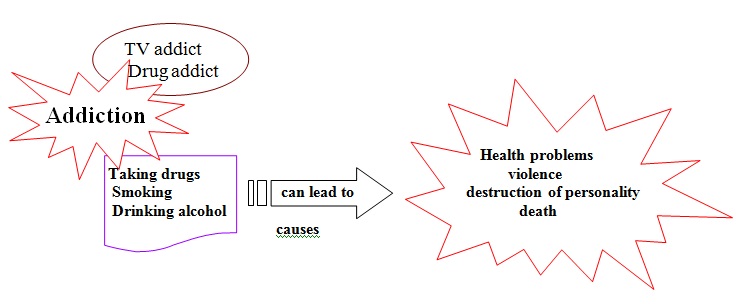
Упражнение 21. Make up a list of arguments against bad habits. Which of the argfuments are the most convincing?
Words you must know: to cause, lead to
New words to remember:
1. argument – довод, аргумент;
2. to convince – убеждать;
3. measure – мера;
4. to affect = to influence — влиять
5. to result in — иметь следствием
Упражнение 22. Make up sentences on the table.
EXAMPLE 1. Smoking makes your teeth yellow.
EXAMPLE 2. If you drink alcohol, you will have slow reactions.
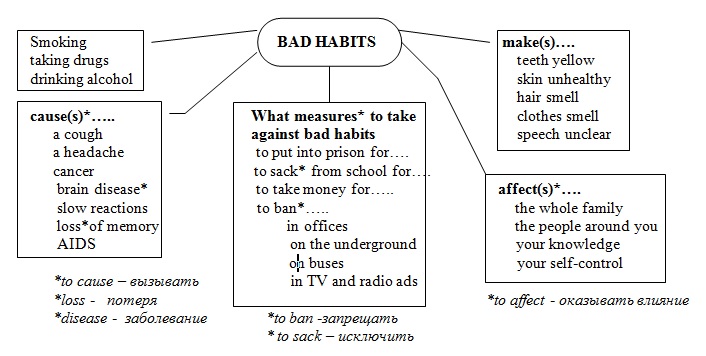
Упражнение 23. Answer the questions.
- What do you think is the best age to be?
- Are there any things that the old can teach the young? Should they teach them or it is better to live them alone so that they could find out about such dangers as drinking achohol and taking drugs by themselves?
- What things were you taught by the older people in your family?
- Are the young people generally more selfish than their parents (grandparents)?
- Some people say that the girls (women) are usually three years more mature than boys (men). Do you agree?
-
What do you think is the ideal age for each of these stages of life?
a. Starting school
b. Starting dating
c. Leaving school/ starting work
d. Leaving parents’ home
e. Getting married
f. Having a child
g. Retiring - Are you afraid of getting old?
- What is the ideal age to live to?
Упражнение 24. Read the text “Bulling” and write an essay on the following:
Some teenagers say that bullying can be stopped only if you ask your friends to help punish the bully. Others say that it could be dangerous and only adults can help.


про публікацію авторської розробки
Додати розробку












































